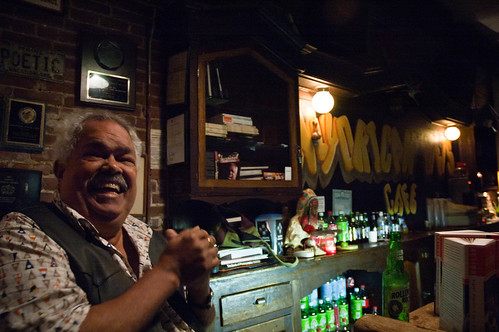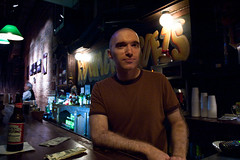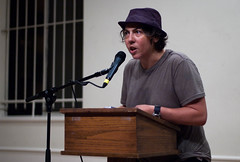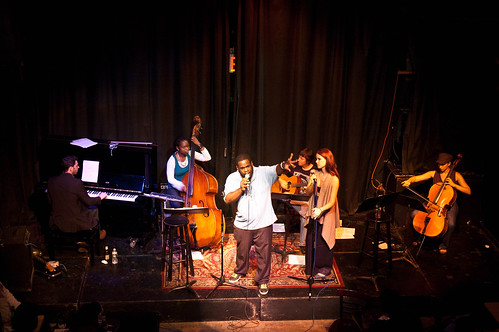 Hannah Thonet Miguel Algarín, founder of the Nuyorican Poets Cafe, still delights in showcasing artists at the organization he established nearly 40 years ago.
Hannah Thonet Miguel Algarín, founder of the Nuyorican Poets Cafe, still delights in showcasing artists at the organization he established nearly 40 years ago.On a gray August afternoon, walking through Tompkins Square Park, I saw dozens of poets huddled behind the bandstand, waiting to read from their own work or participate in an orchestrated performance of Allen Ginsberg’s iconic poem “Howl!” I joined the spectators, outnumbered by the poets, on seats scattered in front of the stage.
If the poets and visionaries of Ginsberg’s youth were “starving, hysterical, naked,” this sample of contemporary New York bards seemed calm and was fully dressed against the threat of light rain. As for starving, we all know there’s no money in the game. The audience for poetry sometimes seems to consist only of other poets, and almost nobody publishes a book of poetry expecting to make money. As one of the dedicated few who haunt poetry readings, and as an occasional poetry performer myself, I wondered how the poetry centers of the East Village were surviving this inhospitable economy.
The answer I got from all of them is that they’re doing pretty well. The Poetry Project at St. Mark’s, most venerable of these institutions, survives on membership fees, private giving, gifts from small foundations, and federal, state and city grants. On one of the last warm days of summer, I sat in the garden behind St. Mark’s church with Stacy Szymaszek, the project director, who told me, “You can never take anything for granted.” Since the September ’08 economic collapse, the Project has devoted more energy than ever to fund-raising.
At the Nuyorican Poet’s Cafe a week or so later, Daniel Gallant, the executive director, gave me a tour of the makeshift basement offices and the stage area. He had good news. The Cafe had just received its first National Endowment for the Arts grant to mount a festival of works celebrating the venue’s history, as well as a valuable grant from the city to develop the building’s upper floors to create a second performance space and offices.
 Hannah Thonet Daniel Gallant, executive director of the Nuyorican Poets Cafe, says that the cafe’s diverse audiences are all compatible.
Hannah Thonet Daniel Gallant, executive director of the Nuyorican Poets Cafe, says that the cafe’s diverse audiences are all compatible.Ownership of its building, purchased from Ellen Stewart, founder of the La Mama Theater, with the city’s help, gives the Nuyorican an advantage in tough times. It moved there in 1980 from its previous home at the Sunshine Cafe, an Irish bar on East Sixth Street. The original bar was wheeled over to the new space on roller-skates. Before East Sixth, Nuyorican poets had met for several years in co-founder Miguel Algarín’s apartment.
The Poetry Project also began as a haven for a small group of like-minded writers, meeting at Cafe Metro on Second Avenue in the early 1960s. Stacy Szymaszek recalls Anne Waldman, director for 10 years, saying “None of us knew if it would last.” In the beginning it was insular, with an emphasis on the downtown poetry scene. Although Ms. Szymaszek emphasizes the importance of the East Village to the Project’s ethos and history – “It’s hard to imagine us existing anywhere else” – audiences now come from all over the country and from overseas, and the program has broadened over the years to cover a wide range of poetic styles.
The Bowery Poetry Club, which just received a Rockefeller Foundation grant to project poems on the walls of city buildings, is a comparative newcomer. It was opened by Bob Holman in 2002. Mr. Holman, a highly visible member of New York’s poetry community, with his narrow-brimmed, battered hat and outsize stage personality, was briefly unavailable for comment. He was in Budapest, “serving up poetry” as he likes to put it. He had previously worked with both the Poetry Project and the Nuyorican. When he had a chance to respond to my emails, he had plenty to say. He left the Nuyorican feeling that “they wanted a more local joint, I wanted more global. I dreamed of seven days a week, accessibility, multi-lingual – a safe space for artists of all stripes and aesthetics to hang out.”
 Hannah Thonet The Poetry Project’s artistic director Stacy Szymaszek participates in a recent poetry reading hosted by the group.
Hannah Thonet The Poetry Project’s artistic director Stacy Szymaszek participates in a recent poetry reading hosted by the group.Unlike the Nuyorican and the Poetry Project, Mr. Holman’s venue does indeed operate like a social club. I’ve often lounged around the front room, drinking coffee and browsing chapbooks and flyers. There are deeper differences between the venues though. I have always thought of the Poetry Project as offering the straight stuff – serious poets reading serious poems. Although the Project embraces different styles, and Ms. Szymaszek describes their programming as “aesthetically generous,” she agrees that the Project’s heart lies with the experimental avant garde.
I’ve found the Nuyorican altogether more boisterous, and as likely to feature an Afro-Jazz combo as a poetry reading. The venue continues to reflect its specific 1970s origins among New York Puerto Rican poets and playwrights, like Mr. Algarín and Miguel Piñero, whose voices were not then heard. Over time, however, a series of communities have come to regard the Café as their own. Adding to the New York Latino tradition of socially and politically immediate writing, Mr. Gallant sees an African-American theatrical tradition, hip-hop artists, and a diverse spoken word and storytelling community. The audiences, he says, are all compatible.
Mr. Holman similarly “rode the waves of performance and multi-cult and slam” when he founded the Bowery Poetry Club. But with all this theater, freestyling, performance art and storytelling on the stage, I wondered if the venues still have room for actual poetry? Mr. Holman refuses to make a distinction. “It’s all real poetry to me. The poet is the sole arbiter.”
Kim Davis is the community editor of The Local East Village.




